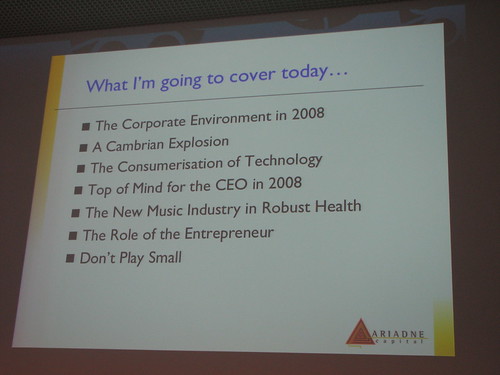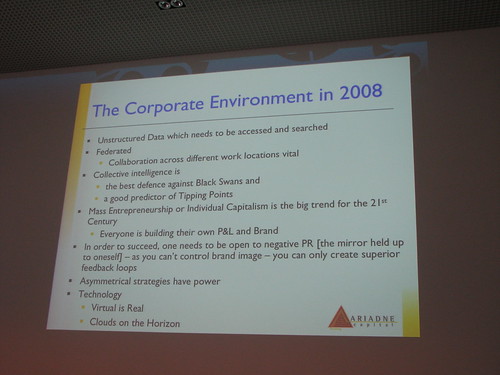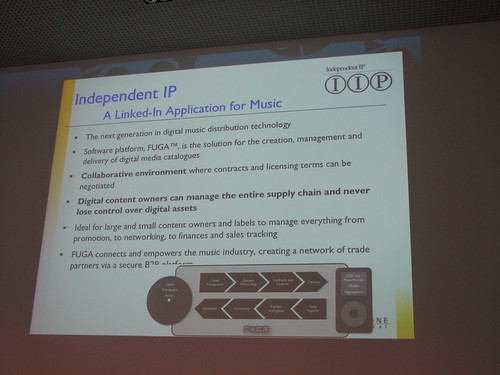steph-note: oops, he’s speaking German. Phew, switching to English  — these are my scribbled notes, inevitably imprecise, of Frans van der Reep’s keynote at the Somesso conference.
— these are my scribbled notes, inevitably imprecise, of Frans van der Reep’s keynote at the Somesso conference.
We have to invest in our ability to observe, see, understand. Frameworks have shifted.
Geography class, flying over countries with our eyes closed. If we turn the map by 45 degrees, our knowledge disappears. Similar to being invited to the blackboard in front of the classroom. The ego also comes in, not accepting that you don’t have the answer. People try to get an answer, so they don’t ask questions where they don’t have an answer.
This map-shifting is what corporations are going through now regarding the internet.
We need people who are capable of shifting and optimising their viewpoints, and who are willing to experience new viewpoints => we need new frameworks.
These frameworks (some of them) are what Frans will present in this speech.

We’re going from top-down to bottom-up, and from push to pull.
Change is coming so rapidly.
A year doesn’t have any commercial meaning. It’s long. => we go from marketing to sales. Example of a company who have no marketing, they just put clothes in shops, leave them 3 weeks and see what sells (remove or add).
Social media makes everyone a salesperson, whether you like it or not. => what are you good at? what’s your personal value? what’s your business? It’s always been like that, but the internet is pushing it to the front of the scene.
Old, top-down, push:
- European Ruling
- Top-down ICT Planning
- Marketing
- Politics
- Innovation planning
New, bottom-up, pull:
- private initiatives
- prototyping
- sales
- referendum
- linux/wiki/csn
We don’t want courts of justice to be bottom right in the box, or it will be lynching in the marketplace. But they’re coming down a bit.

Next slide: 4 ways of organising a company.
Two axes: simple => complex and dynamic => static environment.
If you look at companies, management and control is not necessarily worse an option, but it should be used where it is a solution to a problem. One way => all ways (top right, where the social media stuff is — complex and dynamic).
9% of companies are one-person companies in the Netherlands.
Different worlds, to be used when it makes sense. eg. journalists are in the “all-ways” world, but printing and distribution in the “one way”. No value in putting a company only in the one-way world.

If you don’t adopt the internet as a tool to create transparency, it’s far too expensive to& (?)
Accept multiple viewpoints.

simple/one-way: camouflage (corporations)
complex/dynamic: stand up (what the internet encourages you to do, what the 1-person company forces you to do)

Seen from another angle: on the left, the maintainer, who focuses on what is known. On the right, the entrepreneur, who focuses on what is not known. Shared practice vs. Next practice, and Right practice (control, hold grip) vs. Best practice (enlarge quantity).
Where companies stand in this graph.

Teams, clans, clubs&

Moving from survival of the fittest to survival of the most cooperative => develop the talent to spot talent is the most important thing to do.

One size fits all doesn’t work.
Be transparent, consequent and clear in your intentions. Cooperation is a personal decision.
Comment from the floor: all this is very relevant to the current US presidential election.
Frans: the Middle Ages are a very good model to understand what is going on. Tribes, guilds, torturing and the plague are back& There is a huge power vacuum, in which the Al Qaedas fit in, that’s the political problem we have.
Charles de Neef: seems quite challenging for corporations to move into that top right square, but some big corporations have shown success in adopting the top right mindset/tools.
steph-note: no wifi (at least not working), and timing seems tight — we’ll see how it goes. I count about 50 people in the room.
![]() (I’ve come to dread events in a way, but that’s the subject of another post and has nothing to do with LeWeb’08).
(I’ve come to dread events in a way, but that’s the subject of another post and has nothing to do with LeWeb’08).![]()





























